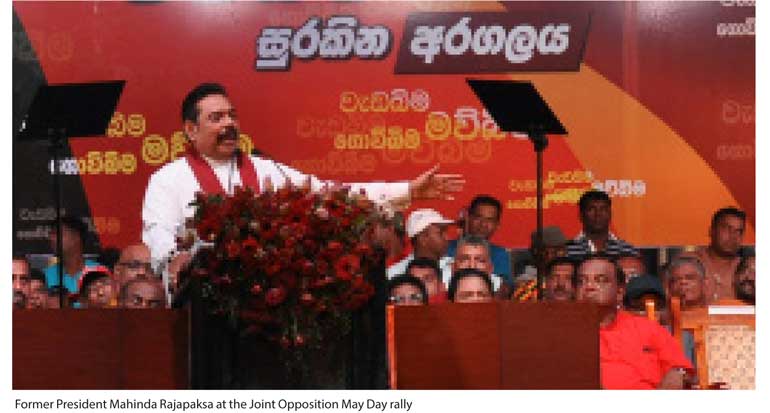Tuesday Feb 17, 2026
Tuesday Feb 17, 2026
Wednesday, 3 May 2017 00:00 - - {{hitsCtrl.values.hits}}

 This writer is not ashamed to confess that the words ‘holy shit’ did escape his lips when some TV channel briefly and fleetingly displayed the human mass gathered, assembled or herded in to Galle Face Green. State-owned Rupavahini was showing the SLFP rally in Kandy. State-owned ITN was transmitting live the proceedings of the UNP rally at Borella. In the age of digital technology such contempt for democratic dissent only helped exacerbate the resentment of the citizenry with the ‘good governance’ charade.
This writer is not ashamed to confess that the words ‘holy shit’ did escape his lips when some TV channel briefly and fleetingly displayed the human mass gathered, assembled or herded in to Galle Face Green. State-owned Rupavahini was showing the SLFP rally in Kandy. State-owned ITN was transmitting live the proceedings of the UNP rally at Borella. In the age of digital technology such contempt for democratic dissent only helped exacerbate the resentment of the citizenry with the ‘good governance’ charade.
May Day, May Day, May Day is the universal distress call used in radio communication by ships and aircraft. Its creator, Frederick Mockford, a senior radio officer at Croydon Airport, claimed that ‘mayday’ sounded like the French word m’aider, which meant “help me”.
Listening to yesterday’s May Day speeches, it occurred to this writer that, it rhymes with another French word ‘merde’ which means shit. And holy shit at that.
There are two more May Days before 2020. So, without wasting time, let us cut to the chase and get to the point. Who had the bigger rally? Mahinda and his Joint Opposition had the biggest, largest and positively preponderant collection of people.
The TV channel that makes no attempt to hide its loyalty and allegiance to Gotabaya Rajapaksa announced it with a creative knockout in political psychology.
“Campbell pitiyata jana ganga galai. Mahanuwarata maha senagak. Galle Face pitiya pireyi.” A human deluge in Campbell Park. A massive multitude in Kandy. Galle face cram-full. A masterpiece of creative excellence in the art of fortifying implied consent in television reporting.
The SLFP filled a pitcher at Getambe. The UNP filled a jug at Campbell Park. In Galle Face the Joint Opposition filled a far larger receptacle, a bucket, nay a barrel, proving that Mahinda is the master of politics of emotion.
In contrast Maithripala in Kandy and Ranil in Borella made sober appeals to reason. Maithri eloquently explained the transformation of the worker in the context of the knowledge economy. Ranil in his customary clumsy Sinhala diction stressed on the imperatives of accessing the global economy.
Mahinda’s message was far more mundane and much simpler. “I was challenged to fill Galle Face Green. Behold the spectacle!”
This May Day was not about workers. It was not about the working class and the exploiting class. Social transformation in the age of digital technology has blurred the boundaries between classes. Politics today is deeply interwoven with popular culture. That is Mahinda Rajapaksa’s home turf.
The hundreds of smart phones that went up to record Mahinda’s triumphal entrance to the stage at Galle Face in its visual pomp tells us that his charisma is embedded in a popular culture that his opponents underestimate at their peril.
In the current phase of Sri Lanka politics, supporting Maithripala is a concession to pragmatic reason. Supporting or listening to Ranil is an effort and a painful effort at that. Supporting or listening to Mahinda Rajapaksa is an emotional experience.
Our democracy is a patrimonial democracy. Out political parties practice clientilistic politics. The average citizenry tend to treat politics as a mode of consumption.
What we witnessed on May Day were several different tournaments held in their respective locations where party leaders were able to assess the performance of their brokers and their ability to mobilise people, supporters or voters, call them what you will.
Janaka Bandara Tennekoon is the son of T.B. Tennakoon, elected to Parliament in 1956 to represent Dambulla. The father was an effective communicator of his time, the epochal days of 1956. He was a virtual virtuoso in the use of Sinhala Kavya that conveyed both common place ideas – common aspirations of common people. The father was a famed poet who edited a monthly poetry magazine called ‘Honda Hitha’.
The son aggrieved by his removal from the position of SLFP organiser of Dambulla has brought 100 buses to the Galle Face rally. There are two lessons to the story. ‘Honda Hitha’ Sinhala poetry magazine has been long extinct. The son ousted from his position of SLFP organiser may or may not enjoy the ‘Honda Hitha’ of the majority of the people of Dambulla. Yet, he has unmistakably demonstrated that he has the financial and organisational muscle to move 100 buses full of willing people to Colombo.
May Day Rallies offer parties the opportunity to monitor and also to demonstrate the relative strengths of their intermediaries or brokers assigned the task of mass mobilisation. It is also a window of opportunity for the intermediaries to express either enthusiasm or apathy towards their party bosses.
The numbers they bring indicate their respective organisational skills and their resources to provide material inducements to ensure attendance at the event.
In the case of the two parties now in office, the matter is relatively easier. The average voter or participant in the rallies of the UNP or the official SLFP may regard participation as a means of ensuring regular flow of patronage goods or services. They may also be compelled by fears of losing them.
The participants in the Galle Face event were moved either by materiel incentive or emotional passion. This writer is passionately opposed to what the Rajapaksa family stands for. That said, this writer is not knave enough to underestimate, ridicule or deride the compelling enthusiasm and the intense passion of a substantial segment of the people who stood and cheered themselves hoarse in praise of Mahinda Rajapaksa.
Two years ago, on 8 January 2015, a majority of us citizens decided to reject the abomination of the 18th Amendment. With a razor  thin majority we decided to remove the obstacles that Gota deliberately placed on our civil liberties. With that same minute margin we eliminated Basil’s depraved assaults on social justice.
thin majority we decided to remove the obstacles that Gota deliberately placed on our civil liberties. With that same minute margin we eliminated Basil’s depraved assaults on social justice.
No one in Galle Face Green on Monday 1 May bothered about the phantom owner of the mansion in Malwana. Ranil did not mention it in Campbell Park. Maithri did not broach it in Kandy.
Mahinda has a clear advantage over his opponents Ranil and Maithripala. His political loyalists stand with him because they too have nothing to lose but the threats of prosecution for past misdeeds. The majority of the Sangha fraternity is with him. The substantial saffron presence on the stage in Galle Face was in sharp contrast the nominal presence of their ilk in Borella and Kandy.
The Sangha stands for continuity of the status quo. People need leaders to lead them to reforms. The Sangha by and large do not want change. Secure in their deeply held prejudices, they refuse, reject solutions that challenge their values. Instead they opt to disbelieve the problem.
There is no question of Mahinda returning. He never left.
– Pic by Lasantha Kumara